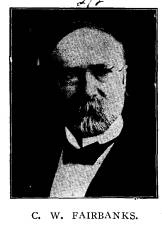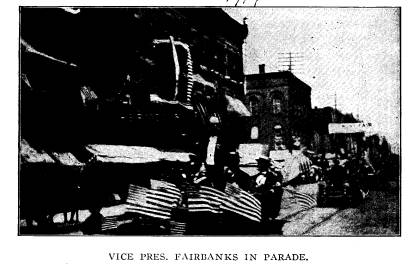Ohio History Journal
|
The Croghan Celebration. 27
ADDRESS OF HON. CHARLES W. FAIRBANKS.
VICE PRESIDENT OF THE UNITED STATES. I am gratified, indeed, to be present and participate with you for a brief while upon this historic occasion. I have not come to make a formal speech, nor did I come to make you a speech at all. According to the programme, I am to indulge only in a few "remarks." What I shall say to you shall be born of the moment. I have brought with me no well-turned phrases. I have come simply to join with you in paying tribute to the memory of men who did valiant service |
|
|
|
remains of this brave soldier to their everlasting sleep beneath the shade of yonder monument. I wish we knew the names of the hundred and sixty men who stood with him August 2, 1813, that we might call the roll of them here to- day and pay to them the tribute of our gratitude and our admiration. The brave commander who rendered illustrious service here in a critical period of the war of 1812, is known to us and his name is upon our lips and it will be sung by our children in days to come, but his brave compatriots are unknown. The one hundred and sixty men who stood here--as brave men as ever placed their lives upon the sacrificial altar of their country--are known, for God Almighty knows men who go down to the battle field to preserve American institutions for ages to come. There is one brave young man, who stood with Croghan, whose name we cannot forget, and which we recall with pride and satisfaction, and that is the name of Ensign Shipp. When the British General Proctor |
28 Ohio Arch. and Hist. Society Publications.
came bearing a flag of truce, supported
by an army trained in the art
of arms -five hundred British, eight
hundred savages, I believe, twelve
hundred in all, -against an hundred and
sixty-one, commander and
soldiery, it was believed that the flag
of truce would win a complete
surrender of the small garrison. But the
British commander knew little
of the metal that was in George Croghan
and Ensign Shipp and the
hundred and fifty-nine others who shared
with them the fortunes of
war. The young commander who had barely
reached his majority sent
to meet the officers bearing the flag of
truce, this young Ensign, younger
still than himself. The British officer
demanded the surrender of the
garrison. The Ensign answered--and
history can never forget his an-
swer: "My commandant and the
garrison," said he, "are determined
to defend the post to the last extremity
and bury ourselves in its ruins
rather than surrender to any force
whatever."
It was pointed out by the British
commander that resistance would
probably result in massacre by the
savages. To this suggestion the
Ensign defiantly replied: "When the
fort shall be taken there will be
none to massacre. It will not be given
up while a man is able to
resist."
This was the note of sublime heroism. It
was essentially the
answer of a brave American patriot. It
was a sentiment kindred to
one uttered by General Grant during the
Civil War. The great General,
as I remember, in one of his campaigns,
crossed a river and sought an
engagement with the enemy with the river
in his rear, and with only
one transport. When it was suggested
that this was, perhaps, inade-
quate provision in the event of the
necessity of a retreat, the great
captain of our armies made the laconic
reply that if he was obliged to
retreat, one transport would be
sufficient.
As Shipp made his way back to the fort,
Major Croghan awaited
him. The latter knew the British would
demand surrender and that
the brave Ensign would decline to accede
to his demand. As the fort
opened for the Ensign's return, Croghan
said: "Come in Shipp and
we will blow them all to Hell."
That was a naughty word. (A voice:
"But it was the right one under the
circumstances.") Yes, you are
right. If it was ever to be used, then
was the occasion to use it, and
I think that a word like that, used in
the cause of liberty, is a dis-
infected word.
(The Vice-President indicated he was
about to close. Several
voices: "Go on! Go on!")
I do not want to talk longer than it
took George Croghan to lick
the British and the savages here. He
illustrated better than any man
can that it is not words which win
victories, but it is deeds that accom-
plish them.
Fellow citizens, American liberty has
cost something. It is a
singular fact that those great blessings
to the human race which it
most longs for, which it most prays for,
always come at the greatest
|
The Croghan Celebration. 29
cost. Humanity, in all her march, back from the early mist of history, down to this present hour, has won her victories for liberty mainly upon the battle field. We who are here to-day are in the enjoyment of liberty which was won upon the field of battle. We are a great, happy, contented nation of eighty millions. We look out across the sea to the Empire of Russia, with her one hundred and forty millions struggling with the great problems of human liberty. We see their wars, we see their massacres, we see their bloodshed unspeakable. We each and every one wish that those people could come out of the bondage of iron rule into the glad sunshine of liberty. America has had five wars: the War of the American Revolution; the War of 1812 which made us forever secure against the efforts of |
|
|
|
Great Britain to wrest liberty from us - the liberty fought for by our continental fathers; the war with Mexico was the third, and I am glad to see here to-day and take by the hand several of the survivors of the war with Mexico. Their presence is an inspiration. It is a curious coincidence that there is now present a man who knew Croghan in the Mexican War. It seems to carry us back from the present to the very presence of the hero of Fort Stephenson. Then the war of the great Rebellion-the mightiest war in the history of man. There are here to-day scores of men bearing upon their breasts the evidence of their loyalty to the Union in the hour of its supremest exigency. And later came the war with Spain. These five wars were fought by the people of the United States, |
30 Ohio Arch. and Hist.
Society Publications.
not to enslave men but to make men free,
to enlarge in a vast degree
the zone of Republican government.
All honor to George Croghan and his
heroic band. All honor
to the soldiers of the revolution. All
honor to the soldiers of the
Mexican war. All honor to the soldiers
of the Union. All honor to
the soldiers of the Spanish-American
war. The American people honor
them. They honor them each and all. They
hold them forever within
the embrace of their fondest memory.
Fellow citizens, it would be impossible
for me to close these few
words without expressing that
appreciation to Col. Webb C. Hayes
which is in the hearts of all of us here
to-day. It is a happy circum-
stance that he, a soldier himself, and a
son of one of the brave defenders
of the Union in the Civil War, should
thoughtfully and generously bring
back from the soil of Kentucky where he
was sleeping his everlasting
sleep the remains of this brave,
fearless leader, in order that they might
rest here amid the theater of his
immortal achievements.
All honor to Colonel Hayes for what he
has so splendidly done,
and all honor to the community which
respects and preserves the memory
of those who have served so well in the
cause of their country.
I will leave you, my friends, and I
leave you with regret. I leave
you, however, with the confident hope
that you will go forward in the
enjoyment of peace and happiness which
are the legitimate fruits of
those who fought here and elsewhere for
Republican government.
ADDRESS OF GENERAL ANDREW L. HARRIS.
GOVERNOR OF OHIO.
The chairman has stated that I will make
a few remarks, and this
is truly said. When your committee came
to Columbus to invite me to
participate on this occasion I frankly
told them that it would be im-
possible for me to make any preparation,
but that I could come provid-
ing no speech was expected of me, and,
fellow citizens, Col. Hayes
gladly accepted the promise, and it was
with that understanding that I
am here to-day, for the purpose of
participating with you in my pres-
ence more than by words or speech on
this memorable occasion.
I sometimes think that we have never
given sufficient importance
in history to the gallant deeds that
were performed here in 1813. You
remember that up to that time the
results of the war seemed against us.
We had met many reverses, but it was
Col. Croghan and his 160 men
who won one of the most important
victories, according to the numbers
engaged on our side and the numbers of
the enemy, that is recorded
in American history. It was from this
moment that the tide of the
battle turned in our favor. From that
time victory after victory followed
until in a few months' time the war was
ended, and victory seemed
vouchsafed to us so far as the mother
country was concerned, the

